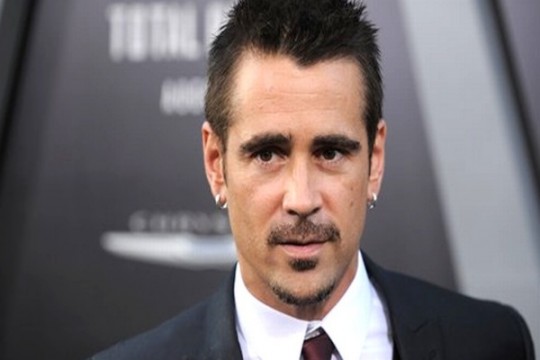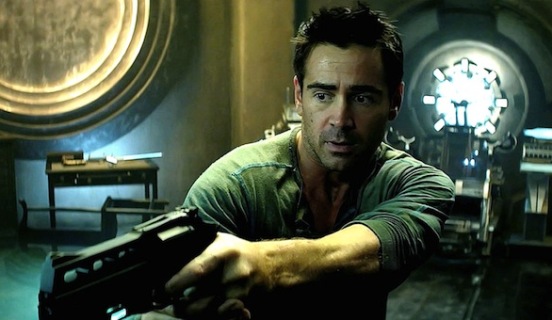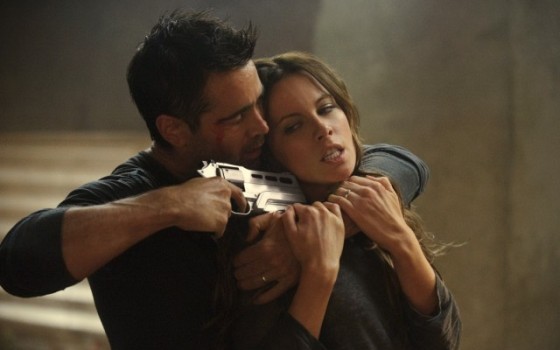The past is just a mental construct.
Colin Farrell has big shoes to fill, both literally and figuratively, as he steps into the role of Douglas Quaid in Sony’s Total Recall remake, which hits theatres this Friday.
The role, which was made famous by Arnold Schwarzenegger in the 1990 film of the same name, is that of a “simple worker suffering from strange violent dreams.” From there, things take off and Quaid soon finds himself on the run as he tries to unravel the secrets of his past.
Recently, at the film’s LA press day, we sat down with Farrell and discussed with him his role in the film. The actor spoke to us about acting opposite himself, kissing the director’s wife, comparisons with the original Total Recall and much, much more.
читать дальшеWe Got This Covered: You had a couple scenes in Total Recall where you were acting opposite yourself. How was that?
Colin Farrell: Movie magic put me in. I remember Sam Jackson saying he loved green screen, because he was working with his favorite actor: himself (laughs). It was fun to do Quaid and Hauser. Hauser was after the fact. That thing on the piano was done 7 or 8 months after the film was finished shooting.
We Got This Covered: Did you go back and look at the original Total Recall before you started filming?
Colin Farrell: I did, but for no other reason than just boldness. Probably more to annoy myself and give myself a dose of the nerves, really. And to see if I could instill myself with any premature regret. I only looked at the film after I had signed on to do it. I’d probably seen the original four or five times in my life and loved it the first time I saw it.
I’ve said in press before that I wasn’t weaned on Arnie’s stuff, but I remember all of his films growing up, from Commando to Red Heat, from Terminator to Running Man and Predator, which still stands to this day as one of the great action films ever made, so I had an idea of what I was getting into. There’s a corner of the film fanatical society of the world that really loved that film and probably feels strongly against anyone revisiting the material, you know. It was different enough. Tonally, when I read the sсript, it felt so different, even though the plot points are the same.
We Got This Covered: This is the second Philip K. Dick adaptation that you’ve done. Did you read the original story?
Colin Farrell: I did read it. I just marveled about how many tiered levels of complexity that Philip K. Dick could achieve in such a short space of time in regards to the fracturing of a person’s psychology and the uncertainty of what was real and what was not. I did such a number on the short story. I couldn’t believe it. I thought it was brilliant. It was nothing like either of the films.
To me, the concept of the implantation of a memory and experience, that’s a fantastic concept, but how that is fleshed out into a feature length story in both films is incredibly different than the short story. I know I’ve read that “this film goes back to the short story” but I’m thinking, “No, it doesn’t. That’s bogus.”
I think, in reflection, that it may be a little bit closer to the short story just because there’s slightly more tension paid to the psychological journey and the existential crisis that Quaid finds himself in in the remake rather than the original. I may be wrong. I haven’t seen the film. I should maybe go and have a look at it, but I think I’ll wait until Wednesday. (laughs)
We Got This Covered: Were you surprised that there weren’t more lines of dialogue closer associated with the original?
Colin Farrell: No. If you’re trying to be different for the sake of being different, then as a general rule, you’ll probably get yourself in a bit of trouble eventually. I think the same rule holds if you’re doing a remake. If you can somehow manage to find a way to have some level of unique storytelling and filmmaking when something is being revisited, while still honoring the context and the story of that thing you want to remake in the first place, well that’s probably a really smart move. I think that’s what the writers on Total Recall seemed to manage. I certainly felt that way when I read it.
There are no one-liners in the film. I like that it went in a different direction. I like that there’s no Mars in the third act. Even though, I was annoyed as a film fan thinking “Aw, there’s no Mars, no mutants, no little person with a machine gun on a bar shooting people.”
The fan in me was going through the things he wanted in the film, but that was the fan in me. He’s a nice guy and stuff, but he’s ten and I say that without any judgment, but I didn’t want him making creative decisions in the film. There was literally a couple more things I would have liked to see in the remake, but I went “No, trust what this is. Trust that it’s different. Trust that it’s a new vision of a story already told,” and that was it.
We Got This Covered: With the current state of the economy, do you think the story of a guy looking to go somewhere to get an escape makes it even more relevant today?
Colin Farrell: Yes. I think anything that is external of the self used to experience some escape from where we find ourselves in our lives at any time, there’s usually some catch inherent in something like that, whether it’s booze or drugs. Maybe the catch is anything that exceeds moderation can get a little bit messier. The catch with this is implicit. When I ask Bokeem’s character if he’s heard of Rekall and he goes “Oh, they mess with your mind,” it alludes to the fact that the science isn’t completely down yet.
The way Len wanted to design it kind of suggests that it’s a little more back-alley than it was in the original. There’s no doubt that every day we’re looking for meaning in our lives. Every single one of us is. I think that starts very young. You’re looking at your parents, if you’re fortunate enough to have both parents, one parent, foster care or whatever it may be, you’re constantly looking for meaning. You’re looking for where you fit in the grand scheme of things.
Total Recall was first and foremost a big action film, there was plenty of existential questioning that I could afford myself as an actor approaching the material about the nature of personality and character and the relevance of history and background. Of course, Quaid finds himself as a new man who is rid of every kind of memory he has in life. Everything that he believes is true, real and experienced is shown to be a fabrication ten or fifteen minutes in. He has no idea who he is. He just has certain feelings and suspicions and doubts more than confirmations. The whole story is him looking to, whether it’s psychologically, emotionally or a marriage of both, confirm to himself who he is.
We Got This Covered: Was it uncomfortable kissing the director’s wife?
Colin Farrell: Oh yeah (laughs). It’s one of the more unfortunate positions I’ve found myself in in fifteen years of doing this racket. And Len wasn’t even polite enough to leave the room. Thank god it barely touched first base.
We Got This Covered: Did you want him to leave the room?
Colin Farrell: No, not at all (laughs).
We Got This Covered: Most sci-fi projects see a pretty bleak future. What you think about the vision of an optimistic future as opposed to the ones commonly seen?
Colin Farrell: Sometimes, the best way to show a person where they are is to show them where they’re heading. Sometimes, people are too close to something to see how it is, but if they’re given a concept of how it might become, they can, through the reference of that concept, have a clearer picture of what stares them straight in the face.
I think science fiction allows a certain distance and a certain objectivity where you go “It’s in the future, so it’s not happening.” So, there’s not an immediate fear or defensiveness that kicks in. Whereas, if it was a criticism of something in the present, it’s too close. It’s too personal that it can’t be allowed to be something that’s actually happening.
It seems that science fiction has the prism of being unreal, a prism of being a future that doesn’t exist and is incredibly fictional. It allows certain things that are very topical and pertinent to be addressed in a way that is kind of subversive, that’s kind of secretive, that kind works on a more subversive level.
The things that Philip K. Dick wrote about are things that human beings have dealt with time memorial since when we were tribal races dotted all over the planet. The idea of power and autonomy and the collective society, the elder and the high priest or the presidents or the chancellors and a group of political aids taking care and representing the goodwill of greater people. The idea of a class system. The upper classes and the proletariat and all these things. So, I think that’s what Philip K. Dick’s writing will continue to be as relevant in eons to come as when he put pen to paper.
@темы: о фильме, Колин Фаррелл, интервью


